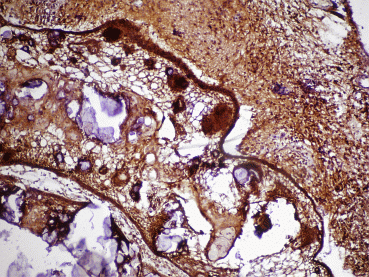ICEECE2012 Poster Presentations Endocrine tumours and neoplasia (112 abstracts)
Expression of ErbB2 in craniopharyngiomas: Possible therapeutic implications
Sayid Shafi Zuhur 1 , Canan Tanik 2 , Selvinaz Velet 1 , Ahmet Murat Musluman 3 , Fevziye Kabukcuoglu 2 & Yuksel Altuntas 1
1Sisli Etfal Training and Research Hospital, Endocrinology and Metabolism Department, Istanbul, Turkey; 2Sisli Etfal Training and Research Hospital, Pathology Department, Istanbul, Turkey; 3Sisli Etfal Training and Research Hospital, Neurosurgery Department, Istanbul, Turkey.
Background: Currently, there is no satisfying treatment option other than gross total or subtotal resection in combination with adjuvant radiotherapy for the treatment of craniopharyngiomas. However, recurrence could occur in a substantial proportion of craniopharyngiomas despite gross total resection and radiotherapy. Human epidermal growth factor receptor 2 (HER-2/ErbB2) overexpression was determined in various human carcinomas and is associated with aggressive clinical behavior. Therefore, ErbB2 has been the target for immunotherapy. To date, ErbB2 immunoexpression has not been determined in craniopharyngiomas.
Purpose: To determine the expression of ErbB2 in craniopharyngiomas to assess the rationale for targeting this receptor for the treatment of craniopharyngiomas.
Methods: The ErbB2 immunostaining was performed on 20 adamantinomatous craniofaryngiomas using avidin-biotin-peroxidase complex method. ErbB2 immunoexpression was evaluated using a light microscope and was interpretted according to the American Society of Clinical Oncology/College of American Pathologists criterions (score 0, no staining or membrane staining is observed in <10% of the tumor cells; score 1+, faint/barely perceivable membrane staining is detected in >10% of the tumor cells, and only part of the membrane is stained; score 2+, weak to moderate complete membrane staining is observed in >10% of the tumor cells; score 3+, strong complete membrane staining is observed in >30% of the tumor cells).
Results: Of the 20 cases evaluated, 2 (10%) were score 3+ for ErbB2. One of these patients was a 12 years old female child who was died soon after the first surgery and the other was a 30 years old male patient who underwent 3 surgeries and radiotherapy due to the repeated recurrences.
Conclusion: Results from this study suggests ErbB2 overexpression in a considerable number of craniopharyngiomas. Further studies are required to assess the efficacy of ErbB2 inhibitors in the treatment of conventional treatment resistant craniopharyngiomas with high ErbB2 expression.
Declaration of interest: The authors declare that there is no conflict of interest that could be perceived as prejudicing the impartiality of the research project.
Funding: This research did not receive any specific grant from any funding agency in the public, commercial or not-for-profit sector.

 }
}



